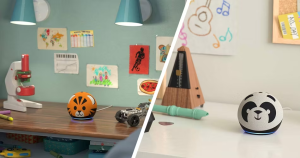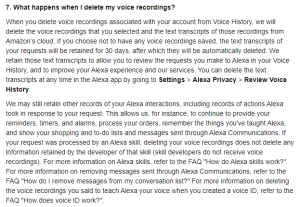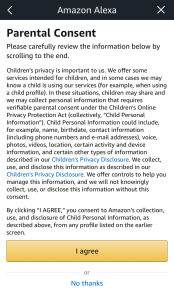Child-Proof Homes or Smart Homes? | The Modern Parenting Paradox
Carolina Lee | June 29, 2022

The smart-home industry is growing fast, and with it, some questionable data collection and processing practices[1]. What used to be stand-alone, offline devices are now interconnected and able to collect and upload vast amounts of personally identifiable information (PII) into the cloud – all from inside the comfort of our own homes.
With the boom of smart home devices, companies like Amazon began to target parents and children for their smart speakers[2]. In 2018, Amazon released the Echo Dot Kids, which they claim in is intended to keep “peace of mind for parents[3].” What they fail to mention, however, is that, since its release, they have been under fire for a number of questionable practices, including: “listening in when it shouldn’t, and even keeping recordings made by the devices after parents have tried to delete them[4].”
Just about a year after its release, early 2019, advocacy groups for privacy, consumer and children protection filed a formal 96-page complaint to the Federal Trade Commission (FTC) calling attention to privacy and ethical concerns around Amazon’s smart speaker designed for kids[5].
For a product that was supposed to help educate children, filter explicit content, and help parents and children alike automate tedious tasks, the early Echo Dot Kids mimicked and brought to life a frightening “Big Brother” dystopia. In its early stages, this smart home speaker violated (and arguably continues to violate) a series of privacy and ethical guidelines set forth by the FTC, Belmont Report, and other privacy and ethical frameworks[6].
In Alexa’s FAQ page, Amazon addresses a number of privacy concerns including ensuring its users that, “Alexa minimize[s] the amount of data sent to the cloud” and that “[users] can review voice recordings associated with [their] account and delete the voice recordings[7].” Interestingly, however, under the “What happens when I delete my voice recordings?”Amazon explicitly outlines that they “may still retain other records of your Alexa interactions, including records of actions Alexa took in response to your request[8].”

Ethical and Privacy Concerns
Despite the formal complaint filed to the FTC a few years ago, the Echo Dot Kids continues to raise some ethical and privacy concerns. It directly challenges the beneficence principle (Belmont Report) in that, when collecting data, it maximizes the benefit for the product and company, while ignoring the harms that might come to the consumer[9]. While the users of the smart speakers for kids benefit from automating tasks and filtering explicit content for children, the harms associated with the collection of data could be far greater. This is because children are a vulnerable population and secondary use of the data is typically unknown to the user and/or loosely regulated[10]; furthermore, children are more susceptible and unsuspecting of how targeted marketing affects “their attitudes, beliefs, and behaviors, shaping their lives” than autonomous adults[11].
In fact, in its true form, these smart “speakers” feel a lot more like smart microphones. In data collection context, Alexa undoubtedly enables surveillance. It records and uploads every interaction made with the product[12]. As to how the children’s data is processed, shared and used, very little is said in Amazon’s Privacy Notice[13] and Children’s Privacy Disclosure[14] – both documents point to each other “for more information” but lack to share any meaningful information on what secondary purposes children’s data might or might not have. Similarly, parents are typically unaware of what they are consenting to when they hit the “agree” button. Lengthy and fragmented policies make it hard for any consumer to truly understand what they are subjecting themselves and their children to when agreeing to use the product.

Parting Thoughts
As technology companies advance into the parent/young children market, they need to create better safeguards around what type of information they choose to collect and share about children. As it stands, the choice between a safer home and a smart one still exists. While it is great that these organizations have found a market for assisting parents, these organizations need to be a lot more transparent, clear and concise with their privacy and usage policies. Parents should be able to make fully informed decisions on what they are willing to subject their children to. Not only do these large companies need to fully comply with COPPA and other regulations, it is their obligation to address ethical and privacy concerns beyond these laws.
Examples of steps they could take would be making an easier-to-read summary of their policy key takeaways so parents can more quickly scan through and give better informed “Parental Consent.” They could also create more transparency by giving users control through a settings/controls hub – where parents should be able to see what type of information is being collected on their child, approve them individually, and request to delete any data at any point directly from the page.
References
[1] Mark Lippett. Privacy, Intelligence, Agency: Security In The Smart Home. Forbes, May 5, 2022. https://www.forbes.com/sites/forbestechcouncil/2022/05/05/privacy-intelligence-agency-security-in-the-smart-home/?sh=6bda67594aac
[2] Lisa Eadicicco. Amazon’s New Echo for Kids Will Train Your Children to Say ‘Please.’ Time, April 25, 2018. https://time.com/5254163/amazon-echo-dot-kids-edition/
[3] Amazon. Echo Dot (4th Gen) Kids | Our cutest Echo designed for kids, with parental controls | Tiger. https://www.amazon.com/Echo-Dot-4th-Gen-Kids/dp/B084J4QQK1
[4] Zak Doffman. Amazon Slammed For Putting Kids At Risk With ‘Blatant Violation Of Privacy Laws.’ Forbes, May 9, 2019. https://www.forbes.com/sites/zakdoffman/2019/05/09/amazons-echo-dot-kids-accused-of-violating-privacy-laws-and-putting-kids-at-risk/?sh=3fcbda7e7e5a
[5] Campaign for a Commercial-Free Childhood (CCFC). Echo Kids Privacy. https://www.echokidsprivacy.com/
[6] Id.
[7] Amazon. Alexa and Alexa Device FAQs. https://www.amazon.com/gp/help/customer/display.html?nodeId=201602230
[8] Id.
[9] The National Commission for the Protection of Human Subjects of Biomedical and Behavioral Research (1979). The Belmont Report: Ethical principles and guidelines for the protection of human subjects of research. U.S. Department of Health and Human Services. https://www.hhs.gov/ohrp/sites/default/files/the-belmont-report-508c_FINAL.pdf
[10] Kate Crawford and Vladan Joler. The mystery of the Amazon Echo data. Privacy International, April 17, 2019. https://privacyinternational.org/news-analysis/2819/mystery-amazon-echo-data
[11] Open Access Government. The importance of protecting and regulating children’s personal data. July 24, 2019. https://www.openaccessgovernment.org/childrens-personal-data/69928/#:~:text=Part%20of%20the%20problem%20is,and%20behaviours%2C%20shaping%20their%20lives.
[12] See note 6.
[13] Amazon. Privacy Notice. https://www.amazon.com/gp/help/customer/display.html?nodeId=468496
[14] Amazon. Children’s Privacy Disclosure. https://www.amazon.com/gp/help/customer/display.html?nodeId=202185560
Images
[1] https://www.moms.com/echo-dot-kids-tips-tricks/
[2] https://www.amazon.com/gp/help/customer/display.html?nodeId=201602230
[3] https://www.commonsense.org/education/sites/default/files/tlr-blog/alexa-0160.png
